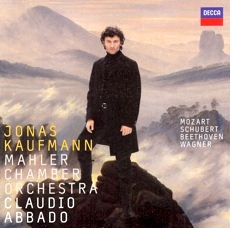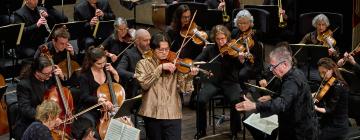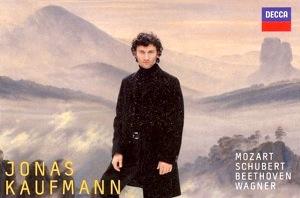
Tenor Jonas Kaufmann will likely be your tenor of the hour, if not the decade, after you hear his new Decca recording of German arias by Mozart, Schubert, Beethoven, and Wagner. Supported and urged on by the Mahler Chamber Orchestra, magnificently conducted by Claudio Abbado, the tenor lavishes as much care, love, and passion on his repertoire as you can ever expect to hear.
Kaufmann’s soulful voice, with its smoky, dark bottom and throaty midrange that seamlessly ascend to a brilliant top, is immediately distinctive. There’s also ample heart in this voice — heart that sings eloquently in the passionate outpourings of Mozart’s Tamino, Beethoven’s Fidelio, Schubert’s Fierrabras and Alfonso, and Wagner’s Lohengrin, Siegmund, and Parsifal.
The voice is also capable, at age 41, of a winning combination of lyric sweetness and dramatic thrust. Lohengrin’s “In fernem land” (In a far-off land) has rarely sounded so sweet at the start. Seducing with its sensitive phrasing, Kaufmann’s heroic lyric instrument ideally conveys the perfection of the Holy Grail. Equally perfect is Abbado’s hand, as the orchestra caresses and cradles the voice as in few recorded recitals. “Mein lieber Schwan!” is just as beautiful as Lohengrin’s Prize Song.
Listen to the Music
Mozart: “Dies Bildnis ist bezaubernd schön”
Kaufmann’s voice may not be as pure as an ideal Tamino would sound, though his passion is golden. There’s also a welcome flexibility of tempo, absent from many modern recordings, that turns metronomic only at the conclusion of “Dies Bildnis ist bezaubernd schön” (This picture is enchanting fair). Even better is the extended scene between Tamino and the gentle Speaker of Michael Volle, which is so alive to the moment as to seem excerpted from an actual performance.
Kaufmann says in the liner notes that we will have to wait quite a long while for him to sing the heavier Wagner roles of Siegfried, Tannhäuser, and Tristan. To increase anticipation, he teases us with a gorgeous version of Siegmund’s “Winterstürme” from Die Walküre. Then he leaves us on hold, as Abbado resolves the selection without segueing into Sieglinde’s longed-for reply. The Parsifal selections are equally rewarding, even if the Grail could glow more brightly at the end.
In dramatic heroic mode, Kaufmann’s Fidelio clarifies why Leonora is so willing to risk her life for him. Listen to his perfect swell from piano to double forte at the start of “Gott! welch Dunkel hier!” (God! What darkness here). What a voice!
Kaufmann may be photogenic heartthrob material from the right angle, yet looks alone only sink so far into the heart. He sings even better than he looks. With two rarely programmed Schubert arias as the icing on the cake, this is a CD to add to your Great Tenors collection. If you don’t have such a collection, it’s a good place to start.

